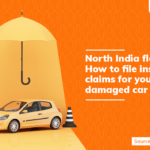North India floods: Here are insurance covers that can protect you against rain-related damage

It is important to have covers for business interruption and ensure that home insurance also includes damage caused by floods
The current spell of heavy rains lashing parts of northern India has once again brought to the fore the importance of insurance coverage for your business and personal assets. Homeowners should ensure their home insurance includes protection against flood damage, while businesses should have comprehensive property insurance.
Currently, there isn’t specific insurance that covers flood-related damages explicitly, and some insurers cover floods as part of the Standard Fire & Special Perils policy. Fire insurance typically covers flood damage, inundation, landslides, rockslides, storms and cyclones.
Business interruption insurance can help businesses recover from financial losses caused by temporary closures due to floods. Jagjeet Siddhu, Chief Distribution Officer, Kotak Mahindra General Insurance, said, “Various insurance covers include storm, tempest, flood, inundation, landslide, rockslide, earthquake, etc. Earthquake is available as an add-on under “Standard Fire and Special Perils” policy. Under MSME products like Sookshma Udyam/Laghu Udyam Suraksha, the same is available as an inbuilt cover. Another important add-on is Debris removal, as flood waters carry a lot of debris/silt and involve costs for its removal. Dewatering expense is also available as an add-on. These add-ons are offered with sub-limit.”
Suitable policies based on value at risk may be purchased by Individuals and Businesses covering their fixed assets in their area of operation. It is recommended to have adequate protection to safeguard against flood risks as the damage it could cause to property is significant. Major claims reported are due to damage to stock, machinery, boundary wall, etc.
Besides, one can opt for the Bharat Griha Raksha policy. The insurance covers your home and home contents, that is, articles or things in your home. Under this policy, the insurance company pays you for the losses, including damage or destruction of the building of your home and articles or things in it. The policy covers earthquakes, volcanic eruptions, or other convulsions of nature.
Comprehensive motor insurance is also essential to cover flood damage to vehicles. The policy typically offers coverage against accidents, theft, and damage caused by natural disasters like floods. However, the extent of coverage may vary depending on the specific policy and insurance provider. It’s significant to vigilantly read the terms and conditions of your policy to understand the coverage provided.
Vivek Chaturvedi, CMO and Head of Direct Sales at Digit Insurance said, “In addition to a comprehensive cover, people living in areas prone to floods must consider buying add-ons like engine and gear box protection cover, zero depreciation cover, consumable cover, roadside assistance cover, and most importantly return to invoice cover. We often see many vehicles getting damaged beyond repair due to floods or vehicles getting completely totalled. Such claims are considered as total losses or write-offs where the salvage cost of the vehicle exceeds its insured value. Buying add-ons like return to invoice cover can help you get the amount mentioned on the invoice, not just the vehicle Insured Declared Value (IDV).
Rahul M Mishra, Co-Founder and Director of Policy Ensure, said, “With the increased risks during floods, such coverage becomes even more important to protect individuals and their families from the financial consequences of accidents. Life insurance offers financial protection to the insured’s beneficiaries in the event of the insured’s death. Given the unpredictability and severity of floods, having life insurance ensures that loved ones are provided for in case of a tragic event.”
What you should do: For those who have been covered, the insured value for the fixed assets declared under the policy would be the maximum limit up to which the compensation is made. “If the property is undervalued, deductions are made in receivable based on the extent of such underinsurance. And, when the assets are covered adequately, settlement is done in full to the extent of damage,” said Siddhu.
Reviewing policy terms, understanding coverage, and promptly reporting damages to the insurance company is important. You’ll need to document damages with photographs and seek professional advice when needed. “Insurance coverage for floods may vary, so careful review of policies and clarification from insurance providers is necessary. Adequate coverage is essential to protect against flood-related risks and ensure individuals and businesses can recover and rebuild after such events,” said Mishra.
How to claim: The policy document carries a claims intimation procedure either electronically or through the post and on the dedicated call centre. You can inform through various options available on policy documents, and the in-house claims team will service the request within the timelines as stipulated.




